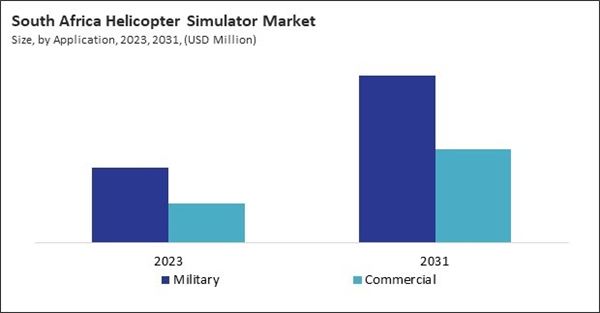The Brazil market dominated the LAMEA Helicopter Simulator Market by country in 2023, and is expected to continue to be a dominant market till 2031; thereby, achieving a market value of $41.9 Million by 2031. The Argentina market is registering a CAGR of 11% during 2024-2031. Additionally, the UAE market is expected to showcase a CAGR of 9.1% during 2024-2031.
The adoption of helicopter simulators has grown steadily due to several key factors. The aviation industry is witnessing a shortage of skilled helicopter pilots, prompting training institutions to invest heavily in simulation-based training programs. Helicopter simulators help bridge this skill gap by offering effective training. Traditional helicopter training is expensive, with high fuel costs, maintenance expenses, and risks associated with real-flight training. Simulators provide a cost-effective alternative, reducing the need for fuel consumption and aircraft wear and tear while ensuring pilot safety.
Additionally, aviation regulatory bodies, such as the Federal Aviation Administration (FAA) and the European Union Aviation Safety Agency (EASA), have mandated simulation-based training for pilot certifications. This has significantly driven the adoption of helicopter simulators in training institutions. Modern helicopter simulators incorporate Virtual Reality (VR), Augmented Reality (AR), and Artificial Intelligence (AI) to enhance training realism. These technological advancements have improved the effectiveness of simulator-based training, making it an attractive option for aviation schools and defense organizations.
In the UAE, the surge in luxury tourism, aerial sightseeing, and helicopter charters for high-net-worth individuals (HNWIs) is driving investments in helicopter operations. Dubai and Abu Dhabi, in particular, have become global hubs for premium air travel experiences, such as helicopter tours over the Burj Khalifa, Palm Jumeirah, and desert safaris. Additionally, the UAE's commitment to aviation excellence, supported by initiatives like the Dubai Aviation City Corporation and Emirates Flight Training Academy, has amplified the need for sophisticated helicopter simulation training. The increasing integration of urban air mobility (UAM) and emergency medical services (HEMS) further strengthens the market for helicopter simulators to ensure skilled pilots operate safely in complex airspaces.
List of Key Companies Profiled
- Thales Group S.A.
- TRU Simulation + Training Inc.
- Frasca International, Inc.
- Airbus SE
- Reiser Simulation and Training GmbH
- CAE Inc.
- FLYIT Simulators, Inc.
- iSim Limited
- Moog Inc.
- L3Harris Technologies, Inc.
Market Report Segmentation
By Product
- Full Flight Simulators
- Fixed Base Simulators
By Application
- Military
- Commercial
By Country
- Brazil
- Argentina
- UAE
- Saudi Arabia
- South Africa
- Nigeria
- Rest of LAMEA
Table of Contents
Companies Mentioned
- Thales Group S.A.
- TRU Simulation + Training Inc.
- Frasca International, Inc.
- Airbus SE
- Reiser Simulation and Training GmbH
- CAE Inc.
- FLYIT Simulators, Inc.
- iSim Limited
- Moog Inc.
- L3Harris Technologies, Inc.









